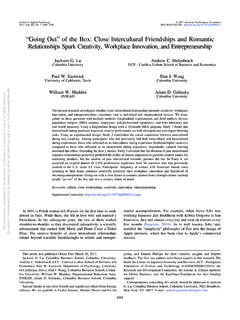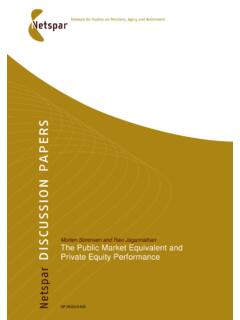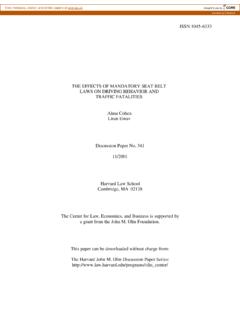Transcription of ISSN 1045-6333 HARVARD - Columbia Business School
1 Electronic copy available at: copy available at: 1045-6333 HARVARD JOHN M. OLIN CENTER FOR LAW, ECONOMICS, AND Business REGULATING BANKERS PAY Lucian A. Bebchuk and Holger Spamann Discussion Paper No. 641 6/2009, Revised 10/2009 HARVARD Law School Cambridge, MA 02138 This paper can be downloaded without charge from: The HARVARD John M. Olin Discussion Paper Series: The Social Science Research Network Electronic Paper Collection: This paper is also a discussion paper of the John M. Olin Center's Program on Corporate Governance Electronic copy available at: copy available at: , Georgetown Law Journal _ (2010) REGULATING BANKERS PAY Lucian A.
2 Bebchuk and Holger Spamann William J. Friedman and Alicia Townsend Friedman Professor of Law, Economics, and Finance, and Director of the Program on Corporate Governance, HARVARD Law School . Executive Director of the Program on Corporate Governance and Terence M. Considine Fellow in Law and Economics, HARVARD Law School . For helpful suggestions and discussions, we would like to thank Charles Calomiris, Justin Cohen, Rafael Eldor, Stavros Gadinis, Assaf Hamdani, Alexander Hellgardt, Howell Jackson, Richard Posner, Jeremy Stein, and participants in talks at HARVARD Law School s corporate law group and Tel Aviv University s Department of Economics, and the June 2009 conference of the Financial Regulation Reform Collaborative.
3 We also wish to express our thanks for the support of the IRRC Institute for Corporate Governance, the HARVARD Law School John M. Olin Center for Law, Economics, and Business , and the HARVARD Law School Program on Corporate Governance. Electronic copy available at: copy available at: Abstract This paper seeks to make three contributions to understanding how banks executive pay has produced incentives for excessive risk-taking and how such pay should be reformed. First, although there is now wide recognition that pay packages focused excessively on short-term results, we analyze a separate and critical distortion that has received little attention.
4 Equity-based awards, coupled with the capital structure of banks, tie executives compensation to a highly levered bet on the value of banks assets. Because bank executives expect to share in any gains that might flow to common shareholders, but are insulated from losses that the realization of risks could impose on preferred shareholders, bondholders, depositors, and taxpayers, executives have incentives to give insufficient weight to the downside of risky strategies. Second, we show that corporate governance reforms aimed at aligning the design of executive pay arrangements with the interests of banks common shareholders such as advisory shareholder votes on compensation arrangements, use of restricted stock awards, and increased director oversight and independence cannot eliminate the identified problem.
5 In fact, the interests of common shareholders could be served by more risk-taking than is socially desirable. Accordingly, while such measures could eliminate risk-taking that is excessive even from shareholders point of view, they cannot be expected to prevent risk-taking that serves shareholders but is socially excessive. Third, we develop a case for using regulation of banks executive pay as an important element of financial regulation. We provide a normative foundation for such pay regulation, analyze how regulators should monitor and regulate bankers pay, and show how pay regulation can complement and reinforce the traditional forms of financial regulation.
6 Keywords: Executive compensation, banks, financial regulation, financial firms, financial crisis, TARP, restricted shares, options, moral hazard, risk-taking, prudential regulation, say on pay, compensation committees. JEL Classification: G28, K23 TABLE OF CONTENTS INTRODUCTION .. 1 I. EXECUTIVES 8 A. MORAL HAZARD IN 9 B. CAPITAL AND COMPENSATION 11 1. Debt at the Operating Bank Level .. 11 2. Debt at the Bank Holding Company Level .. 12 C. STOCK 16 D. CITIGROUP AND BANK OF 20 E. WHY BONDHOLDERS CANNOT BE RELIED ON TO REGULATE 21 F.
7 CONSISTENCY WITH THE WIPING OUT OF EXECUTIVES 23 G. HAS THE FINANCIAL CRISIS ELIMINATED THE PROBLEM? .. 25 1. Excessive Risk-Taking .. 28 2. Excessive Reluctance to Raise and Deploy Capital .. 29 II. THE LIMITS OF CORPORATE GOVERNANCE REFORMS .. 31 A. MANDATING THE USE OF RESTRICTED STOCK? .. 32 B. SAY-ON-PAY?.. 34 C. STRENGTHENING DIRECTORS ROLE AND INDEPENDENCE? .. 35 III. TOWARD REGULATING BANKERS PAY .. 36 A. GOING BEYOND PRUDENTIAL 39 B. MONITORING AND REGULATING BANKERS 41 1. Monitoring Incentives .. 41 2. Regulating Incentives.
8 42 C. COMBINING OLD AND NEW 45 IV. CONCLUSION .. 47 INTRODUCTION Excessive risk-taking in the financial sector has played an important role in the major financial crisis of 2008 09. There is widespread concern that executive compensation arrangements could have encouraged excessive risk-taking, and that fixing these arrangements will be important in preventing such excesses in the future. But what exactly has been wrong with bank executives pay, how should it be fixed, and is there a reason for government intervention?
9 These questions are the focus of this paper. We make three contributions. First, we identify key features of executive compensation arrangements that have provided bank executives with excessive risk-taking incentives, but that have thus far received little attention. It is now well recognized that, by enabling executives to cash large amounts of equity-based and bonus compensation before the long-term consequences of decisions are realized, pay arrangements have provided executives with incentives to focus excessively on short-term results and give insufficient weight to the consequences that risk-taking would have for long-term shareholder This problem.
10 Which was first highlighted several years ago in a book and accompanying articles co-authored by one of us,2 has become widely accepted in the aftermath of the financial crisis. 3 In this paper, however, we identify a distinct and separate problem: bank executives pay has been tied to highly levered bets on the value of banks assets, giving executives little incentive to take into account the losses that risk-taking could impose on preferred shareholders, bondholders, depositors, and taxpayers.



















